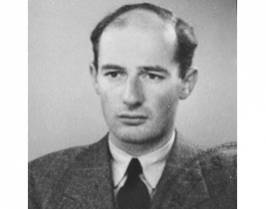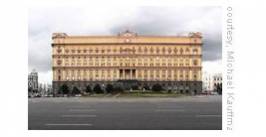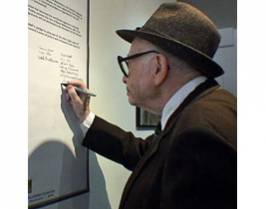 Raoul Wallenberg, who saved thousands of Hungarian Jews in 1944
Raoul Wallenberg, who saved thousands of Hungarian Jews in 1944Swedish humanitarian worker Raoul Wallenberg is credited with saving tens of thousands of Hungarian Jews from deportation to Nazi concentration camps during World War II. But after Soviet troops took control of Budapest in 1945, he was arrested and never seen or heard from again.
On what would have been his 97th birthday, August 4, the International Raoul Wallenberg Foundation brought together survivors rescued by Wallenberg to renew the call for Russian officials to unseal the record of his fate.
Many of the people in their 70s and 80s who gathered recently at the International Raoul Wallenberg Foundation‘s Manhattan offices lived through the Nazi terror in Hungary. They all credited their lives to the same man, Raoul Wallenberg, a young Swede who briefly ran the Budapest arm of a U.S. agency called the War Refugee Board.
According to those witnesses, during his six months in Hungary in 1944, Wallenberg would coolly, calmly intervene to save Jews destined for concentration camps by handing out false Swedish identity papers, sometimes as Nazi and Hungarian fascist troops stood by. Those rescued were then sheltered in ”safe” buildings on which Wallenberg posted signs like ”Swedish Library,” to claim diplomatic status.
 Kayla Kaufman, 74, was saved by Wallenberg, together with her parents and siblings.
Kayla Kaufman, 74, was saved by Wallenberg, together with her parents and siblings.Kayla Kaufman, now a great-grandmother who still works in public relations, was one of the lucky ones. ”In the Talmud, it says if you save one life, it’s like saving the world,” she often says.
She was saved along with her parents and three siblings. ”And today we are 201 people because of his miraculous work, his courageous work. And the 100,000 he saved probably number a million today.”
Kaufman never met Wallenberg. Her family was saved after her father, a rabbi, was plucked out of a death-march by Wallenberg, and pleaded as well for his wife and children. ”And he [Kaufman’s father] said when you saw this person, for whatever reason it was, the Nazis sort of made way for him,” Kaufman said. ”He had this charisma, this sort of like, ‘Yes, I can, and you can’t stop me.’ He was a young kid, like 31, 32.”
Wallenberg, a Swedish Lutheran, survived the Nazis, but was arrested on suspicion of being a U.S. spy when Soviet troops took control of Budapest in January 1945. Historians say the order came from high officials at the KGB, or perhaps even directly from Soviet leader Joseph Stalin. Nothing was ever heard from Wallenberg again. Historians say that Sweden saw him as an obstacle to good relations with the Soviet Union and did not ask for his return, although the arrest violated international law.
 Lubyanka Prison in Moscow, where Wallenberg may have lived out his life.
Lubyanka Prison in Moscow, where Wallenberg may have lived out his life.According to a Wall Street Journal investigation this year that quoted memos archived in Russia’s Foreign Ministry, Sweden’s ambassador to the Soviet Union told the deputy Soviet foreign minister in December 1945 that ”it would be splendid if the mission were to be given a reply … that Wallenberg is dead.” Six months later, the report said, the memos say he made the same suggestion to Stalin, who replied that the case would be ”examined and solved.”
Twelve years later, Soviet officials released a document saying that Wallenberg had died of natural causes in a Moscow prison in 1947. But some inconclusive reports suggest that he lived past that date, and that he may have been executed.
Groups dedicated to Wallenberg have made his heroism more widely known. But as Holocaust historian Mordecai Paldiel notes, ”We still don’t know what happened to the man.” Paldiel says there is every reason, however, to believe that former Soviet officials are still alive who have direct knowledge of what happened to Wallenberg. Even younger former KGB operatives, he notes, such as Russian Prime Minister Vladimir Putin, might be privy to the truth.
 A man signing the petition for Russia to disclose Wallenberg’s fate.
A man signing the petition for Russia to disclose Wallenberg’s fate.So, the Foundation and the survivors continue to press for Russian leaders to encourage the story to be told, and to release all records relating to Wallenberg. ”It’s in the interests of everyone, including the Russian authorities, to come out with the full story, to put it behind us,” Paldiel says. But he believes that those who were involved in Wallenberg’s imprisonment and possible execution will never disclose what they know unless they are given judicial immunity by Russia’s government.
To publicize their campaign, the Foundation gathered together for the first time New York-area survivors saved by Wallenberg. The elderly men and women, together with friends and family, marked what would have been Raoul Wallenberg’s 97th birthday by adding their signatures to a poster for a worldwide campaign, ”100,000 Names for 100,000 Lives,” aimed at discovering Wallenberg’s fate. The plea will be delivered to Russian President Dmitri Medvedev.
